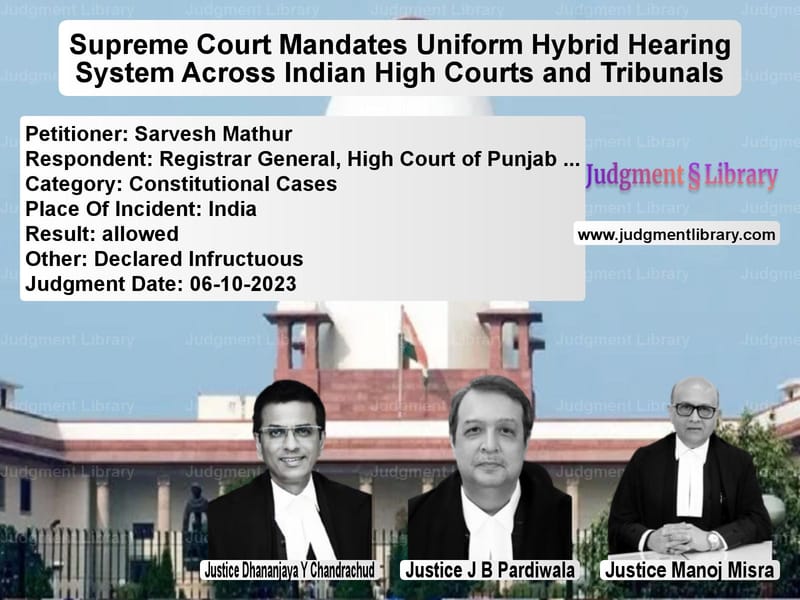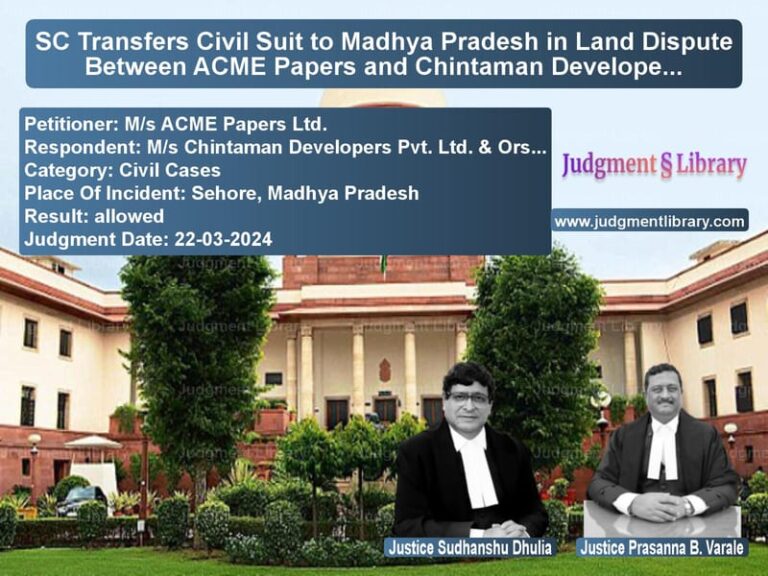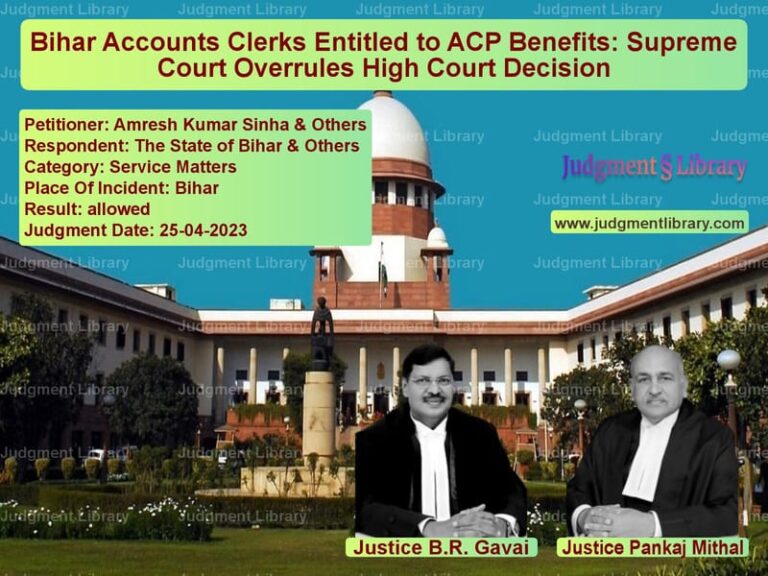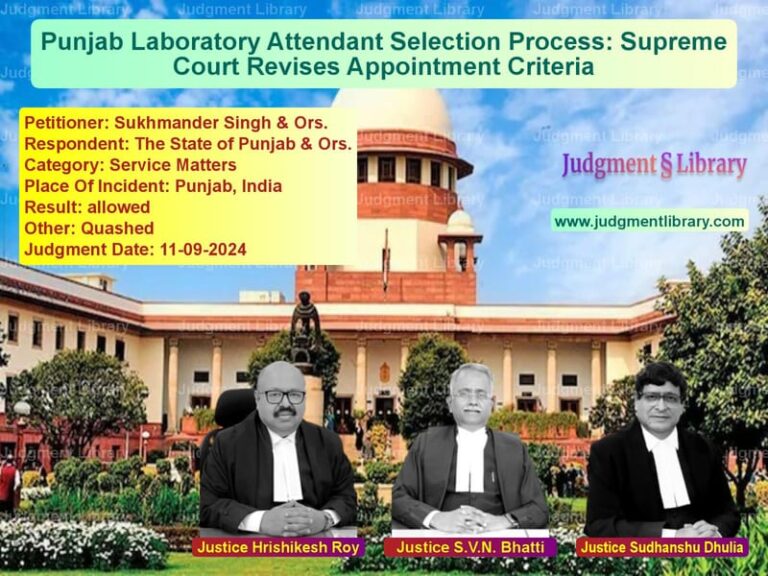Supreme Court Mandates Uniform Hybrid Hearing System Across Indian High Courts and Tribunals
The Supreme Court of India, in its recent judgment in Sarvesh Mathur vs. The Registrar General, High Court of Punjab and Haryana, has issued significant directives aimed at standardizing hybrid and virtual court hearings across all High Courts and tribunals in India. The ruling emphasizes the necessity of adopting modern technology to ensure access to justice and efficient court functioning.
Background of the Case
The petitioner, Sarvesh Mathur, filed a writ petition raising concerns about the inconsistent application of virtual and hybrid hearing facilities across various courts in India. He argued that while some High Courts provided seamless virtual hearings, others imposed arbitrary restrictions, thereby denying equal access to justice.
In response, the Supreme Court sought reports from:
- All High Courts of India
- National Company Law Appellate Tribunal (NCLAT)
- National Consumer Disputes Redressal Commission (NCDRC)
- National Green Tribunal (NGT)
- Other relevant tribunals under various ministries
Arguments by the Petitioner – Sarvesh Mathur
The petitioner highlighted several key issues:
- Inconsistency in Virtual Hearings: Some High Courts allowed hybrid hearings liberally, while others either denied them or imposed arbitrary restrictions.
- Pre-registration Requirements: Some courts required lawyers to apply three days in advance to seek virtual hearing access.
- Discriminatory Age-Based Restrictions: Certain courts only allowed lawyers aged 65 and above to use virtual hearings, unfairly excluding younger lawyers.
- Absence of Wi-Fi and Internet Facilities: Many High Courts did not provide free internet access for lawyers and litigants, limiting their ability to access case information digitally.
- Lack of Hybrid Infrastructure: Some tribunals, including the NCLAT, cited funding issues as reasons for their inability to implement hybrid hearings.
Arguments by the Respondent – The Registrar General, High Court of Punjab and Haryana
The respondent, representing the judiciary, presented the following arguments:
- Progress in Virtual Hearings: Many High Courts had adopted hybrid hearing systems, but the implementation varied due to infrastructural challenges.
- Security and Technological Limitations: Some courts faced cybersecurity threats and technical difficulties that hindered the expansion of virtual access.
- Low Demand for Virtual Hearings: Certain courts reported very few requests for hybrid hearings, which they cited as a reason for their limited adoption.
- Government Funding Issues: Some tribunals stated that they lacked adequate funding from the Union Government to upgrade their infrastructure for hybrid hearings.
Key Observations by the Supreme Court
The Supreme Court made several critical observations:
1. Disparity in Virtual Hearing Adoption
The Court found that while some High Courts had effectively implemented hybrid hearing systems, others had conducted as few as three virtual hearings in three months. This highlighted a need for uniformity.
2. Arbitrary SOPs Restricting Virtual Access
The Court criticized the requirement of prior applications for virtual hearings and the age-based restrictions, stating:
“The age restriction would unfairly disadvantage younger lawyers and restrict access to technology only in the hands of the seniors at the Bar.”
3. Lack of Internet and Digital Facilities
The Court expressed concern that lawyers and litigants lacked access to basic internet facilities within court premises, making digital case management difficult.
4. Urgent Need for Uniform Guidelines
The Court emphasized that a common Standard Operating Procedure (SOP) should be established across all High Courts to ensure equal access to virtual hearings.
5. Government’s Role in Tribunal Modernization
The Court directed the Union Ministries of Finance and Corporate Affairs to allocate funds within one month for upgrading the hybrid hearing infrastructure in NCLAT and other tribunals.
Supreme Court’s Final Ruling
The Supreme Court issued a series of landmark directives:
1. Mandatory Hybrid Hearing Access
Within two weeks, all High Courts must ensure that hybrid hearings are available for any lawyer or litigant requesting them, without requiring prior approval.
2. Funding for Technological Upgrades
State governments were directed to allocate necessary funds to ensure that High Courts have the infrastructure required for hybrid hearings.
3. Free Wi-Fi Access in Court Premises
All High Courts must provide free Wi-Fi within their premises to enable lawyers and litigants to access online resources.
4. No Prior Approval for Virtual Hearings
Courts must allow virtual participation without requiring prior registration. The hearing links must be included in the daily cause-list for accessibility.
5. Uniform SOP for Virtual Hearings
The Court directed Justice Rajiv Shakdher of the Delhi High Court to draft a model SOP in collaboration with amici curiae for uniform implementation across all High Courts.
6. Data Collection on Virtual Hearings
All High Courts must submit reports detailing:
- The number of hybrid hearings conducted since April 1, 2023
- The number of video conferencing licenses obtained
- The steps taken to improve internet access within courts
7. Government to Improve Internet Access in Remote Areas
The Union Ministry of Electronics & Information Technology was directed to work with the Department of Justice to improve internet connectivity in North-East India, Uttarakhand, Himachal Pradesh, and Jammu & Kashmir.
Read also: https://judgmentlibrary.com/supreme-court-rules-in-favor-of-oci-student-in-neet-pg-admission-case/
8. Mandatory Training for Judges and Lawyers
All High Courts must provide training to judges and lawyers on using hybrid hearing technology, with training programs implemented within two weeks.
9. Tribunal Compliance Deadline
Tribunals including CESTAT, ITAT, NCLAT, NCLT, AFT, NCDRC, NGT, SAT, CAT, DRATs, and DRTs must start hybrid hearings by November 15, 2023.
Implications of the Judgment
The Supreme Court’s ruling has far-reaching effects:
- Equal Access to Justice: All lawyers and litigants can now access hybrid hearings without restrictions.
- Technological Advancement in Courts: State and central governments must allocate funds to modernize court infrastructure.
- Prevention of Procedural Barriers: Courts cannot impose arbitrary restrictions on virtual participation.
- Accountability of High Courts: Mandatory reporting ensures compliance with digital accessibility mandates.
Conclusion
The Supreme Court’s judgment in Sarvesh Mathur vs. The Registrar General is a landmark ruling that transforms India’s judicial access. By mandating a uniform hybrid hearing system, the Court has reinforced the role of technology in ensuring speedy and efficient justice. The implementation of these directives will ensure that legal proceedings in India embrace modern technological advancements, making justice more accessible and inclusive.
Read also: https://judgmentlibrary.com/supreme-court-strengthens-protection-for-child-victims-under-pocso-act/
Petitioner Name: Sarvesh Mathur.Respondent Name: Registrar General, High Court of Punjab and Haryana.Judgment By: Justice Dhananjaya Y Chandrachud, Justice J B Pardiwala, Justice Manoj Misra.Place Of Incident: India.Judgment Date: 06-10-2023.
Don’t miss out on the full details! Download the complete judgment in PDF format below and gain valuable insights instantly!
Download Judgment: sarvesh-mathur-vs-registrar-general,-h-supreme-court-of-india-judgment-dated-06-10-2023.pdf
Directly Download Judgment: Directly download this Judgment
See all petitions in Fundamental Rights
See all petitions in Public Interest Litigation
See all petitions in Judicial Review
See all petitions in Judgment by Dhananjaya Y Chandrachud
See all petitions in Judgment by J.B. Pardiwala
See all petitions in Judgment by Manoj Misra
See all petitions in allowed
See all petitions in Declared Infructuous
See all petitions in supreme court of India judgments October 2023
See all petitions in 2023 judgments
See all posts in Constitutional Cases Category
See all allowed petitions in Constitutional Cases Category
See all Dismissed petitions in Constitutional Cases Category
See all partially allowed petitions in Constitutional Cases Category







